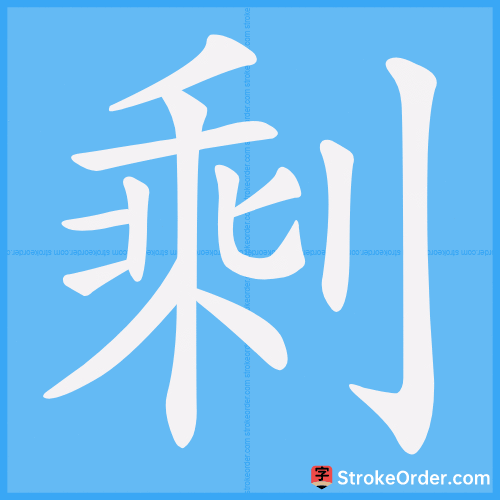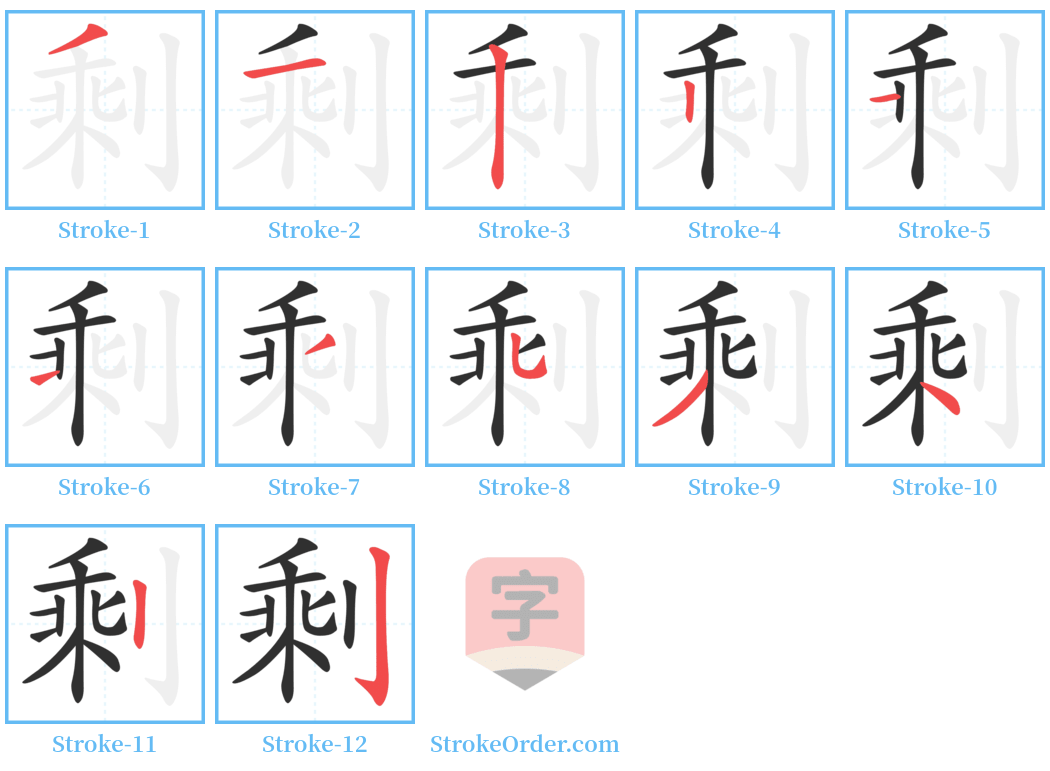剩 Stroke Order
Animated Stroke Order of 剩

Stroke Order Diagrams for 剩

Step-by-Step Handwriting Guide for 剩

Learn to Write Chinese Characters with Video Tutorials
Watch the video of writing the Chinese character "剩", learn the correct stroke order (笔顺) of the character "剩", and master the standard way of writing the character "剩".
Free Printable Handwriting Practice with Stroke Order: 剩
Printable Writing Practice Worksheet of "剩" in Portrait Orientation (Tian Zi Ge)

Printable Writing Practice Worksheet of "剩" in Landscape Orientation (Tian Zi Ge)

Information of 剩
Pinyin
shèng
Radical
刂
Strokes
12 strokes
Usage
★★★★★
Definition
have as remainder
剩 [shèng]
形 (Adjective)
1. 多余,余留下来的。
(Too much; surplus, leftover)
例:~余。~菜。~货。~勇(余勇,如“宜将~~追穷寇”)。~水残山。所~无几。就~他一个人。
引:
1. 《聊斋志异·狼三则》:一屠晚归,担中肉尽,止有剩骨。
(A butcher returned late, with his load emptied, only leftover bones remained.)
2. 清· 洪亮吉《治平篇》:使野无闲田,民无剩力。
(Ensure no idle land in the fields, so the people have no surplus strength.)
例:
又如: 剩员 (surplus personnel); 剩语 (superfluous words); 剩货 (excess goods).
2. 多
(Too much)
例:宋· 方岳《最高楼》:且容侬,多种竹,剩栽梅。
(Let me plant more bamboo, and there will be excess of plum trees.)
副 (Adverb)
1. 表示程度,相当于“更”、“更加”。
(Indicates degree, equivalent to "more")
引:
1. 《字汇》:剩,盖也。
2. 表示无条件限制,相当于“尽管”。
(Indicates unconditional limitations, equivalent to "though")
引:
1. 宋· 欧阳修《蝶恋花》:老去风情应不到,凭君剩把芳尊倒。
(As age wanes, the charm may be lost, I rely on you to pour the fragrant wine.)
动 (Verb)
1. 余留下来。
(Be left over)
例:所剩无几; 给你剩多少?
(How much is left for you?)
2. 阉割。
(Castrate)
引:
1. 《齐民要术》:拟供厨者宜剩之。剩法,生十余日,用布裹齿脉碎之。
(Those intended for the kitchen should be castrated. The method is to keep them for more than ten days, and then wrap their flesh in a cloth.)
Input Method for 剩
Pinyin
sheng4
Wubi
tuxj
Cangjie
hpln
Zhengma
mfrk
Four Corner
22900
Unicode
U+5269
Same Pronunciation Characters